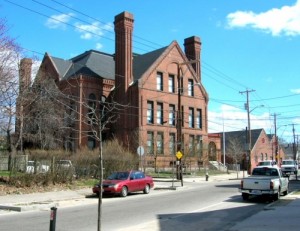“Would I send my child to this school?” This is a question I asked myself every day while working at Achievement First and helping to build their first high school in Brooklyn, NY in 2009 and 2010. I served as the Director of Student Life at Achievement First Crown Heights High School (now called AF Brooklyn High School), which entailed developing and managing all after-school and summer enrichment programs, building the advisory system for both college skills and character development, counseling students, and organizing and leading community events each week to contribute to school culture. As a member of the founding team, I was involved in almost every aspect of the school, from hiring, to behavior management, to building systems for school culture and discipline, to working with others in the Achievement First network to find and implement best practices for our new school.
There are many things to say about my time at Achievement First; some of them personal opinion, some experiences shared among many. Let’s start with some of the things AF does really well. AF hires incredible teachers. Walking through the halls of almost any AF school, you will find hard-working, dedicated and passionate educators in front of our children. The principles behind a longer school day are right on—to keep kids off the streets and out of trouble, and in classrooms getting extra academic time to support their achievement. Systems and data are both priorities, from my experience, in the AF network. For example, every behavior management system we tried at the high school in our first year was systematized in a way that ideally would have allowed every adult in the building to enforce these norms. Also, data-driven instruction is the driving force I would argue behind teacher development. Teachers and their coaches (usually a senior member of the school leadership team) work with both daily and long-term assessment data to improve lesson plans and increase student achievement.
While the strengths I mentioned above are real, the underlying approach to youth and community development are, in my opinion and experience, fundamentally flawed. This has a detrimental impact on the students and families in Achievement First schools, specifically in high schools.
The majority of my students at AF Crown Heights High School were fed in from AF Crown Heights Middle School, with approximately 10% being accepted off the wait list. Almost all of my students had relatively positive experiences at the AF middle school, due largely in part to their principal and teaching staff. When they arrived at high school, it became apparent to them and their families very quickly that this was a different AF than they had known before. As the Director of Student Life, I too became frustrated early on with the philosophy of youth development the school administrators (backed strongly by the AF network) were implementing.
I believe, especially at the high school level, that there must be a balance between structure and flexibility, between rules and independence, and between thinking inside a predetermined box and creative thought. Unfortunately, I witnessed time and time again students being pushed to “fall in line” with the rigid behavior system (sitting up perfectly straight in class; not wearing any jewelry or headbands for girls; having a closed bottle of anything other than water on their desk; making eye contact 100% of the time when being addressed by an adult; etc.). Rules are important. However, these examples are a few of many that AF labeled as character development, which I disagree with.
Character development for high school students is about having the opportunity to make one’s own choices and sometimes fail, but being able to meaningfully learn from those mistakes.Character at AF was defined as “doing the right thing when no one is looking.” However, because of the extreme emphasis on these small behavioral “infractions” to the system, there was a culture of conformity rather than critical thinking that was created. This resulted in students superficially following the rules but feeling like they had to hide their true selves while at school. We often saw students get in trouble for losing their temper because they felt so repressed by the culture of the building, which AF labeled as a character flaw on the part of the student.
In addition to being developmentally inappropriate for the age of our students, the school system was oppressive in other ways. I would receive phone calls from parents and families on a daily basis because they felt disrespected by AF leadership. Many parents felt the rules in the school were over the top and not beneficial to the “college preparatory mission” of the school. Many parents were called up to the school on a regular basis to have meetings with school administrators to address student discipline issues, often times even for minor infractions. Usually, students were not allowed to attend academic classes until these parent meetings happened (students in this situation would sit alone in a classroom or in the main office all day and independently do work assigned by their teachers even though they often couldn’t complete the work because they hadn’t received the lesson for the day. Perhaps because their shoes were 98% black instead of 100% black. For instance). Parents reported feeling devalued, disrespected, and frustrated by AF’s condescending approach to family involvement.
This leads me to my second concern about Achievement First’s proposed expansion. AF works in low-income communities of color in urban areas in New Haven, CT and Brooklyn, NY. From my experience, the mentality by many at the head of the organization and by association many of the school leaders as well, is one of disregard for the indigenous community they are entering. Rather than becoming a part of the neighborhoods in which they operate, AF most often runs schools that end up isolating the community in the surrounding area. Instead of valuing the parent and family contributions of their student body, many AF schools underestimate the power and capability of the families they are supposed to be serving. I always got the feeling that “we” were there to “fix a problem.” “We” were there to “save these kids.” The message to our students was often, “if you don’t do things ‘our’ way, you will never be successful in the ‘real world.’” As an organization working to serve urban populations, this kind of cultural insensitivity and sense of superiority are deeply harmful to the students, the families and the communities in which AF operates schools.
This is not about me. And I don’t want it to be about my experience. I left AF after my kids finished their ninth grade year for many reasons. I still speak to my kids and their families on a regular basis. When I left, half of the founding team left as well. By the start of the school’s second year, the 10th grade class (my kids) was down to a group of approximately 45-50. This year, the third year of the school, the founding class is down to around 35-40 students. This is the same trend in the AF high school in New Haven, which has graduated less than 30 kids the last two years (which they call a 100% graduation rate). I wanted to make sure that the voices of the families I’ve worked with for the last several years from AF Brooklyn High School were represented in this statement. They all asked me to keep their names confidential as they did not want their kids, some of whom still attend AF Brooklyn High School, to be penalized in any way for their speaking out.
From a family member who still has a child in Achievement First:
“The focus is always on discipline and consequences. It makes the kids not want to go to school. Even the really good students don’t want to go to school. My experience is probably way better than another parent’s because my daughter is academically and socially sound. But I’ve sat and chatted with so many parents and know the horror stories are more the norm than not. If we had to rely just on Achievement First to get my daughter what she needed for college, it would never happen. They’re setting the kids up for failure.”
From a parent who pulled her daughter out of AF:
“The AF teachers are dedicated to the success of the students and the school. Public schools are difficult because achievement is not always the focus. Charter schools are good for lower grades because it gives kids the discipline they need. But my daughter gained a sense of purpose from the great teachers and mentors at AF, and the fact that she knew everyone had one goal which was for her to succeed. But at the upper grades AF is training the kids to do what they want them to do and AF won’t relinquish control. They’re supposed to be allowed to use what they know, to let their budding minds grow. They aren’t allowed to think for themselves. AF is an experiment to see what ‘kids who wouldn’t have a chance otherwise’ can do if they follow the AF model. They push the discipline too much. But you can’t run an experiment on the backs of the children who are really trying. Our children are not getting what they’re supposed to get.”
From a parent whose daughter still attends Achievement First:
“All of the good counselors and teachers are leaving or have already left because they feel trapped and confined. The children are caged—they treat the children like it’s a boot camp. The good kids are made to feel like they’re bad kids and in prison. The kids are just hanging on to get out and move on with their lives. As a parent who speaks her mind and stands up for my daughter’s education, they shut me down and now they don’t even talk to me anymore. They are disrespectful and mistrusting of the parents like we’re crazy.I think it’s a race thing. These people come from all over the place to hold back our kids. The people who really love our kids do not get the time of day to do things for our kids. There are teachers who would do anything for these kids but they get brainwashed or they leave. They don’t want the children to associate with the teachers who really love them because it undermines their control.”
I’ll say the same thing to anyone reading this statement as I said to everyone I worked with at Achievement First: If you wouldn’t send your kid here, then it’s not good enough.
Bari L. Katz
 “The Inconvenient Truth Behind Waiting For “Superman”” highlights the real-life experiences of public school parents, students and educators to show how these so-called reforms are actually hurting public education. The film discusses the kinds of real reform – inside schools and in our society as a whole – that we urgently need to genuinely transform education in this country.
“The Inconvenient Truth Behind Waiting For “Superman”” highlights the real-life experiences of public school parents, students and educators to show how these so-called reforms are actually hurting public education. The film discusses the kinds of real reform – inside schools and in our society as a whole – that we urgently need to genuinely transform education in this country.











 As it turns out, Monty Python was right: Finland isn’t just a
As it turns out, Monty Python was right: Finland isn’t just a  Since 1997, YouthBuild Providence has been re-engaging and inspiring returning students who are pursuing secondary education and provided low-income youth with the skills necessary to build a more financially secure future and more stable communities. YouthBuild serves 16-24 years olds who are often parents, homeless, returning to their communities from prison, and suffering from physical or emotional trauma.
Since 1997, YouthBuild Providence has been re-engaging and inspiring returning students who are pursuing secondary education and provided low-income youth with the skills necessary to build a more financially secure future and more stable communities. YouthBuild serves 16-24 years olds who are often parents, homeless, returning to their communities from prison, and suffering from physical or emotional trauma. According to the Achievement First website, this person is part of their leadership team:
According to the Achievement First website, this person is part of their leadership team: